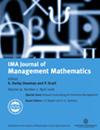Modelling team performance in soccer using tactical features derived from position tracking data
IF 4.3
3区 工程技术
Q3 MANAGEMENT
引用次数: 14
Abstract
Decision-makers in soccer routinely assess the tactical behaviour of a team and its opponents both during and after the game to optimize performance. Currently, this assessment is typically driven by notational analysis and observation. Therefore, potential high-impact decisions are often made based on limited or even biased information. With the current study, we aimed to quantitatively assess tactical performance by abstracting a set of spatiotemporal features from the general offensive principles of play in soccer using position tracking data, and to train a machine learning classifier to predict match outcome based on these features computed over the full game as well as only parts of the game. Based on the results of these analyses, we describe a proof of concept of a decision support system for coaches and managers. In an analysis of 302 professional Dutch Eredivisie matches, we were able to train a Linear Discriminant Analysis model to predict match outcome with fair to good (74.1%) accuracy with features computed over the full match, and 67.9% accuracy with features computed over only 1/4th of the match. We therefore conclude that using only position tracking data, we can provide valuable feedback to coaches about how their team is executing the various principles of play, and how these principles are contributing to overall performance.利用位置跟踪数据得出的战术特征建模足球队的表现
足球决策者通常会在比赛期间和比赛结束后评估球队及其对手的战术行为,以优化表现。目前,这种评估通常是由符号分析和观察驱动的。因此,潜在的高影响力决策往往是基于有限甚至有偏见的信息做出的。在目前的研究中,我们的目标是通过使用位置跟踪数据从足球比赛的一般进攻原则中提取一组时空特征来定量评估战术表现,并训练机器学习分类器,根据在整场比赛以及比赛的部分时间计算的这些特征来预测比赛结果。基于这些分析的结果,我们描述了教练和经理决策支持系统的概念验证。在对302场荷兰职业荷甲联赛的分析中,我们能够训练一个线性判别分析模型,用在整场比赛中计算的特征来预测比赛结果,准确率为74.1%,用在比赛的1/4时间内计算的特征预测比赛结果的准确率为67.9%。因此,我们得出结论,只使用位置跟踪数据,我们就可以向教练提供有价值的反馈,告诉他们的团队如何执行各种比赛原则,以及这些原则如何对整体表现做出贡献。
本文章由计算机程序翻译,如有差异,请以英文原文为准。
求助全文
约1分钟内获得全文
求助全文
来源期刊

IMA Journal of Management Mathematics
OPERATIONS RESEARCH & MANAGEMENT SCIENCE-MATHEMATICS, INTERDISCIPLINARY APPLICATIONS
CiteScore
4.70
自引率
17.60%
发文量
15
审稿时长
>12 weeks
期刊介绍:
The mission of this quarterly journal is to publish mathematical research of the highest quality, impact and relevance that can be directly utilised or have demonstrable potential to be employed by managers in profit, not-for-profit, third party and governmental/public organisations to improve their practices. Thus the research must be quantitative and of the highest quality if it is to be published in the journal. Furthermore, the outcome of the research must be ultimately useful for managers. The journal also publishes novel meta-analyses of the literature, reviews of the "state-of-the art" in a manner that provides new insight, and genuine applications of mathematics to real-world problems in the form of case studies. The journal welcomes papers dealing with topics in Operational Research and Management Science, Operations Management, Decision Sciences, Transportation Science, Marketing Science, Analytics, and Financial and Risk Modelling.
 求助内容:
求助内容: 应助结果提醒方式:
应助结果提醒方式:


